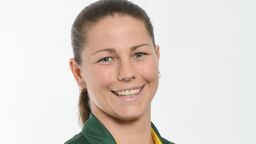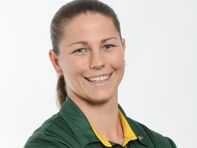There are ‘they’ days and there are ‘he’ days, but every day is a fencing day.
As a college fencer, I went through the cycle of fear, hardship, then ultimately acceptance, when I came out as pansexual. I then got to commune with neighbors when I found acceptance at Vassar College’s LGBTQ+ Athletes group, became a squad leader on the varsity fencing team, and ultimately won the New England Intercollegiate Fencing Championship as a junior before the pandemic took our season the following year.
I continue examining my relationship with queerness as I transition from athlete to coach and from cisgender to genderqueer identity. The principles of trust, acceptance and flexibility are important to me.
As queer folk know, coming out isn’t something we do once. We do it over and over again, staking faith — or bravery in the absence of faith — in the individuals we choose to invite into our lives with more clarity. We then hope for acceptance, and when the world only meets us halfway (or not at all) we act in flexibility too, whether in discreet solidarity or various shades of repression. And when things go well, we’re in communion with our neighbors.
Get off the sidelines and into the game
Our weekly playbook is packed with everything from locker room chatter to pressing LGBTQ sports issues.
My time living in New York offered a somewhat hospitable environment for beginning the journey of questioning my identity. I had access to professors, teammates and classmates from different walks of life, most of who had generally encouraging experiences to share.
Even on a progressive campus like Vassar, though, occasional homophobic blowback hindered my self-actualization. I remember one instance when a male athlete commented on neon pink track pants I was wearing, postulating that I mustn’t be the one “wearing the pants” in my relationship.
Even with flare-ups like these, which I just used as motivation in the weight room and on the fencing piste, I generally felt comfortable with my sexuality at Vassar because I was empowered by fellow queer and allied athletes on my mixed-gender team.
It’s easy to find atmospheres like Vassar’s when you’re triangulating between cities like New York, Boston and Montreal. I grew up a regional stone’s throw from some of the gayest cultural centers I can think of, such as Greenwich Village and Provincetown. I grew up in deep blue states with access to gender-affirming healthcare and abortion rights. Though not perfect, it is easier to trust, accept and be flexible there.
A Midwest move
After I earned a bachelor’s degree, I moved to St. Louis for graduate school. Missouri is different from New England, and not just politically.
The weather is extreme, for one. We get blizzards up north; fair enough. But in St. Louis, when it’s hot, it’s scalding; when it’s cold, it’s frigid; and when it rains, it floods. The leaves aren’t as pretty, but the people in St. Louis are. I find occasional refuge in an alternative lifestyle bar downtown with a slogan welcoming “all the misfit toys.”
This and university life complement fencing in St. Louis, too. I began fencing at the St. Louis Fencing Center when I first moved to town, and at a tournament in Chicago I met Margherita Guzzi Vincenti and Abbas Fadel, the best coach-athlete duo in U.S. Fencing (this isn’t just a matter of affectionate opinion — Margherita ranks No. 1 in the U.S. for women’s epee at the time of writing, and the USA left the 2022 Pan-American championships with a gold medal with her at the helm of the team event).

They welcomed me to Ataba Fencing Club, in a quiet suburb of Milwaukee. When I’m not coaching, I still compete, so high-end training environments complement what I’m able to accomplish both as a coach and as an athlete. A thousand miles away from the fencing community I’d spent over a decade part of, kind strangers accepted me. For those of you doing the math, St. Louis is about a six-hour drive from Milwaukee. But for world-class training, 2 a.m. wakeup times to make it to practice on weekends requires some flexibility.
It’s the in-between in the Midwest that occasionally concerns me.
The cities tend to be progressive and they vote accordingly. It’s the drives through rural Illinois, Iowa, Kentucky and Tennessee, and even more than half an hour west of St. Louis, that get me. I see Confederate flags, signs for Trump-endorsed candidates lobbying against abortion rights, and building-sized billboards promising damnation for those who get abortions and for gay, bi, lesbian and genderqueer individuals — people like me.
For 24 years, the Missouri Nondiscrimination Act, “which would ban discrimination based on sexual orientation or gender identity,” has failed to pass state legislature. Worse than queerphobic apathy, an amendment barring trans athletes from sports teams passed the House with little GOP resistance in April. This is one of 15 such bills gaining traction in Missouri.
The fencing club’s I’d compete at weren’t far away from the billboards and the alt-right lawn signs. I still remember the looks I got when I first walked into a Missouri tournament wearing a rainbow shirt. It is therefore with cautious pride that I drive my gay pride flag-adorned car into the Missourian countryside for fencing or other endeavors. The greater fencing community nationwide, however, provides confident refuge from this paranoia.
From athlete to coach
I started coaching by accident. The summer before I moved to St. Louis, my coach, Eric Soyka, called in a favor to five-time Olympian and American fencing great Michael Marx, who then agreed to train me. Michael is a fencing master who’s produced a countless number of elite fencers and coaches over a storied career.
The only problem was that I had no idea how I was going to pay for my training. Unfortunately for Michael, but fortunately for me, he sustained an injury during a fencing lesson that I was watching that left him unable to coach without great pain and immobility. (In fencing, a “lesson” refers to a one-on-one practice between a coach and an athlete that supplements group practices.) The solution? Michael would sit on the side of the piste, telling me how to conduct the lesson, and between this and my training, we’d call it even.

This resulted in a terrific summer experience — vaccinated and ready to emerge from my pandemic slumber, I would commute to Marx Fencing Academy in Concord, Massachusetts, for six to eight hours a day of intense workouts, one-on-one lessons with other MFA staff, and, of course, the lessons that I was learning to give daily.
Marx Fencing Academy, much like my previous and subsequent fencing clubs, is a tight-knit family. Many of the athletes grow up together, training under Marx’s world-class staff from as young as 10 years old to high school graduation and beyond. There is a culture of excellence and Michael’s rigorous, consistent fencing system embraces that. Coming from a series of smaller, scrappier, different clubs, I was worried that I would be seen by others as an outsider and someone who Michael chose to keep around as a favor. Instead, I was accepted.
Once I moved to Missouri, things became more complicated. As an out person in a state with anti-LGBT discrimination still legal, I was anxious about getting a coaching career off the ground in a state without much fencing and without as much support for those who are different. However, I found work as an assistant coach.
Then my boss at that club hired me as the head coach of St. Louis Fencing Club. In my new role, I concern myself with facilitating excellent fencing. I conduct group practices, support athletes in tournaments, and facilitate one-on-one training sessions. I’m also motivated to create a welcoming environment for athletes of all ages, races, creeds, physical abilities, genders and orientations.
Our club in the city is fortunate to train a variety of fencers from backgrounds that might be scrutinized elsewhere. All this is not to say I’ve encountered more overt hostility as a queer person in fencing than kindness. In fact, I’ve met a vast web of allies and LGBTQ+ community members in fencing — athletes, coaches, referees and more. As I transition from cisgender to nonbinary identity, I’m confident that network will support me.
I feel I try to live a life of trust when I participate in the athletic communities in places where tolerance isn’t as much of a given as I’d like it to be. Inter-club politics are often toxic in the fencing community, as with all sports involving businesses that people rely upon for their livelihoods. As head coach of my club, I intend to extend the trust and acceptance to my athletes, competitors, and the greater community to reciprocate the trust and acceptance I hope they have for me.
The principles that guide my relationship with my queerness also comprise my coaching philosophy, with both being built on the foundations of trust, acceptance and flexibility. The coach-athlete relationship is built on trust at numerous levels. There is the imminent level of trust required between coaches, athletes and family members that coaches are going to protect their athletes and act purely with best intentions in mind.
There is also an intellectual trust required — when I instruct people, I’m facilitating them to do something new with their bodies and forming habits and tactics different from those with which they were equipped before. Accordingly, part of my coaching philosophy is to repeatedly thank my athletes for trusting me the way I would like to be trusted. Likewise, I trust them to show up, work hard and try new things with an open mind.
I cannot coach where I’m not wanted. I can compete where I’m not wanted, but I cannot create something great with people who don’t want me to create it. Accordingly, the engine of my coaching system is fueled by acceptance — acceptance of me not just as a coach who knows what they’re doing, but as an individual.
There is an increasing number of days during which I don’t feel like a man and instead am the genderless, nonbinary embodiment of a person who does things. And coaching is my favorite actualizing thing to do. The fluid transition between masculinity and androgyny — which is still an oscillation for me, rather a march in one direction, for now — is just another manifestation of the flexibility that allows me to respond to environments as an athlete and now as a coach.
When I first started coming out years ago, choosing whom to invite in was a scary task that needed to be repeated routinely. The need for that repetition isn’t going anywhere, but I feel much freer in being in communion with my neighbors as I am.
I began a fencing career as a pansexual, cisgender athlete in New York. I now continue that development as a nonbinary man, nay, a nonbinary coach creating something here in St. Louis. The elements that define me as an athlete — flexibility, trust, and acceptance — continue to facilitate me as a coach and as an individual.
Abram Gregory, 23, is the head coach of St. Louis Fencing Club and an assistant at The Phoenix Center. They are also an assistant coordinator at St. Louis University’s Writing Services. An alum of Vassar College, Abram was part of Vassar’s Queer, Trans and Non-Binary Athletes group. They are pursuing a career in coaching and law, and can be reached by email ([email protected]), or on Instagram (abe_gregory).
Read Abram’s coming out story.
Story editor: Jim Buzinski







































